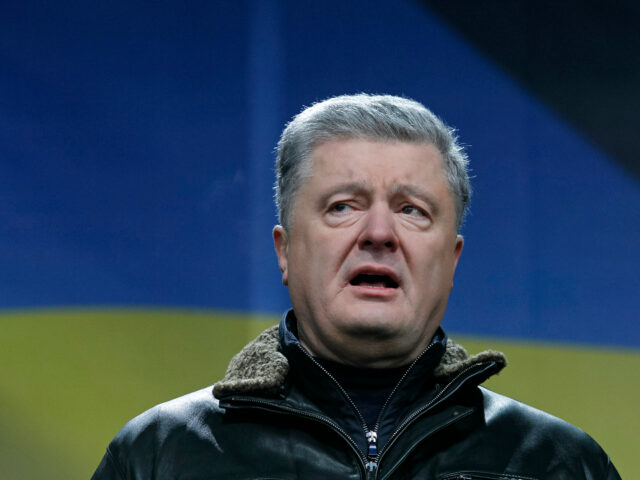Ukrainian intelligence agencies blocked former President Petro Poroshenko from leaving the country to meet with Hungarian leader Viktor Orbán over an alleged Kremlin plot to diminish Western support for Ukraine’s war effort against Russia.
The Security Service of Ukraine (SBU) announced on Saturday that it was behind the decision from the Verkhovna Rada parliament in Kyiv to block a planned trip to Budapest by Petro Poroshenko, who served as the president of Ukraine for five years after coming to power on the heels of a Western-backed coup against his predecessor Viktor Yanukovych over his decision to reject EU demands of economic exclusivity and complete rejection of ties to Russia.
The SBU alleged that Poroshenko’s planned meeting with Hungarian President Viktor Orbán fell in line with a broader Russian intelligence effort to “encourage representatives of Ukrainian politicians to declare narratives about the need for a negotiation process with the [Russian Federation] in the context of war freezing.”
“The main goal of the enemy is to reduce the support of foreign partners and try to split Ukrainian society from within,” the SBU said, while claiming the meeting would have been used by Russian propaganda and would make the former president a “tool in the hands of the Russian special services.” The SBU did not state whether Poroshenko was a witting participant in the plot, however.
Under Ukraine’s martial law, which President Zelensky — who defeated Poroshenko in his 2019 re-election bid — instituted last year following the Russian invasion, any male aged between 18 and 60 years old are prevented from leaving the country without special dispensation.
So far, neither Poroshenko nor Orbán have confirmed that they were planning to meet, however, following the incident, the Hungarian prime minister’s spokesman Zoltan Kovacs said per the AP that Hungary “does not wish to play any part in (President Zelensky’s) internal political struggles.” Poroshenko, for his part, who still leads the centre-right European Solidarity party and a potential political challenger of Zelensky’s, said that the move to block him at the border on Friday was “an attack on unity”.
The controversy comes amid increasing political divisions within Ukraine in the wake of the failure of the so-called ‘Spring Offensive’ to recapture any meaningful amount of territory currently occupied by Russian forces.
On Friday, Kyiv mayor and former heavyweight boxing champion Vitali Klitschko accused Zelensky of shifting towards authoritarianism, reportedly saying: “At some point we will no longer be any different from Russia, where everything depends on the whim of one man.”
Zelensky, whose first presidential term is set to expire next year, has indicated that elections will not be held in 2024, saying that it would be “irresponsible” to hold a vote while Russian forces are occupying large swaths of the country. The comedian-turned-president has also come under criticism for shutting down supposedly pro-Russian media outlets within the country, banning leading opposition parties, and seeking to ban the Ukrainian Orthodox Church for alleged ties to Moscow.
Despite democracy being a necessary requirement for joining the European Union, leading officials in Brussels have called for Ukraine’s ascension to the bloc to be put on a sped-up timeline, with many pushing for membership talks to begin this month. However, Hungary announced this week that it would not agree to open talks, while Prime Minister Orbán previously stated that Ukraine is “light years” away from joining the bloc.
Given that each member state of the EU holds veto power over the admission of any new country, Orbán has the ability to prevent Ukraine from joining the EU. Orbán, who has been one of the few Western leaders to call for peace negotiations between Kyiv and Moscow consistently, has argued that it would be unwise to admit a country currently at war and whose borders remain in flux, given the possibility of dragging Europe into a hot conflict with Russia.
For this stance, the Security Service of Ukraine accused the Hungarian leader of being “anti-Ukrainian”.

COMMENTS
Please let us know if you're having issues with commenting.